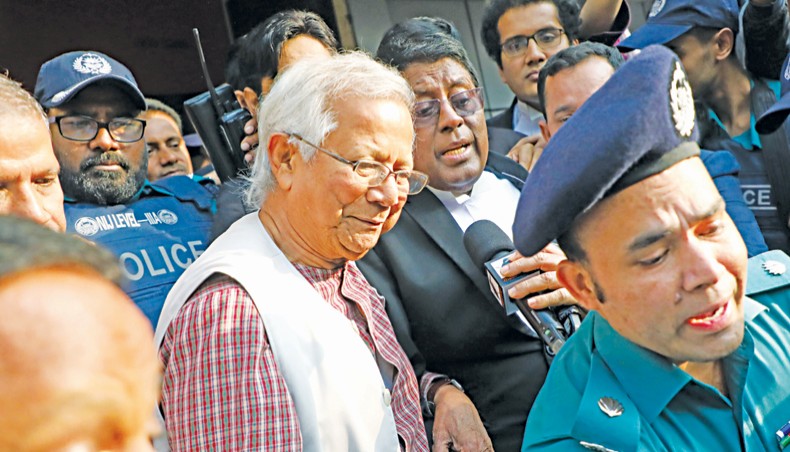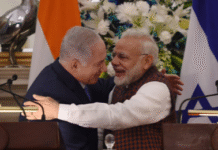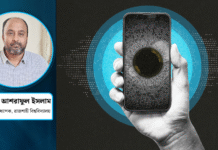
Nobel laureate Muhammad Yunus emerges from court in Dhaka after the court sentences him and three Grameen Telecom top officials to imprisonment in a case over labour law violation. — New Age/Sony Ramany
Md Mahmudul Hasan : IN THE eighteenth and nineteenth centuries, a number of Western scholars — such as William Jones (1746–1794), Stephen Weston (1747–1830), James Atkinson (1780–1852), and Louisa Costello (1799–1870) — translated paMd Mahmudul Hasan rts of Persian poet Firdawsi’s Shahnama into English. But it was Matthew Arnold’s ‘Sohrab and Rustum: An Episode’ (1853) that made the epic widely known among English/global readers.
Later, BW Robinson (1912–2005) translated sections of Shahnama, and Arthur George Warner and Edmond Warner rendered the epic in its entirety into English. The Warner brothers’ translation is published in several volumes under the title of The Shahnama of Firdausi (1905–25), from which James Kritzeck includes an excerpt titled ‘Rustam and Sohrab’ in his Anthology of Islamic Literature (1964). The quotes from the poem later in this essay are taken from Kritzeck’s book.
Sohrab was Rustam’s son by one of his earlier wives, Tahmina. To continue to follow the calling of war, the legendary Persian hero left Tahmina before Sohrab was born. He gave Tahmina a signet (seal) and instructed her to hand it to their future offspring if it were a boy. Rustam was confident that his son would become a great hero like him and the seal would help the father and the son to recognise and unite with each other.
After Sohrab was born, Tahmina sent a message to (mis)inform Rustam that she had given birth to a girl. She dreaded that if she disclosed correct information, Rustam would snatch away the son from her to train him to be a warrior like himself.
Meanwhile Sohrab grew into a great fighter under Afrasiab, the king of Turan. His name and fame as an invincible hero spread at home and abroad. In bravery and valour, Sohrab surpassed all contemporary heroes except his father Rustam.
Long story short, a war broke out between Iran and Turan. Sohrab heard the war drum and left his mother to plunge into the war. Failing to stop Sohrab from entering into hostilities, Tahmina bound on his arm the signet left by Rustam. She instructed Sohrab to look for his father and show him the heirloom so that they could recognise each other. Sohrab marched into the battlefield with dual goals: to flaunt his power and to find his father.
With Sohrab the ‘maddened elephant’ among their rank and file, the Turks (people of Turan) forged ahead with courage and confidence. Conversely, Kaus (Kai-Káús), the mythical Shah of Iran, was gripped by anxiety and consternation, as he had no match among the Iranian combatants to encounter Sohrab in a pre-war duel. Kaus’ sense of helplessness was exacerbated by the fact that, by that time, Rustam had gone into retirement.
Having no alternative, Kaus entreated Rustam to consider coming back to the battlefield, as it was a matter of national emergency. Rustam reluctantly agreed to do so but under a pseudonym. Worried that he might be defeated by Sohrab in the duel and thus lose face, Rustam did not want to risk the loss of past glory associated with his name.
As the Orientalist John Malcolm narrates in The History of Persia (1815), Rustam and Sohrab ‘met three times. The first time they parted by mutual consent, though Sohrab had the advantage; the second, the youth obtained a victory, but granted life to his unknown father; the third was fatal to Sohrab.’
The moment Sohrab saw Rustam in the battlefield, he had a hunch that it was his father. Rustam’s physical features matched the description that Sohrab heard from his mother. Sohrab said to the Turanian (Turkish) army general Humān:
‘That lion-man… is as tall as I am
…
His very feet and stirrups move my love
And make me blush, for I perceive in him
The marks whereof my mother spake.’
Sohrab expressed reluctance to fight a man who resembled his father. Conversely, unaware of the existence of his son, Rustam could not imagine that his young foe could be none other than his own boy.
Humān belied and convinced Sohrab that it was not Rustam, saying:
‘Rustam oft hath encountered me:
This charger is like his, except in action.’
Humān persuaded Sohrab to continue fighting the duel.
Having failed on this front, Sohrab went to the battlefield the next day and attempted to dissuade Rustam from fighting. He said to Rustam:
‘For as my foe thou shouldst not hide thy name,
Art thou the famous Rustam?’
Rustam thought that the young warrior was trying to play a trick on him. He said:
‘I have known ups and downs, and am not one
To practice guile upon.’
Having exhausted all avenues to deter Rustam from fighting, Sohrab finally started combatting. He overpowered the heavy Rustam and lifted him up only to fling him to the ground. He drew his dagger to cut off his father’s head. Fearing death, Rustam tricked Sohrab into believing that a true warrior kills his opponent only after throwing him on the ground for the second time. The credulous Sohrab took Rustam’s words at face value and let him go.
It is said that formerly God had given Rustam so much might and muscle
‘That if he walked upon a rock his feet
Would sink therein.’
Such excessive strength was a source of continuous trouble for him. Hence, Rustam asked God to decrease his strength a bit so that he could lead a normal life. His prayers were answered. Now, after finding himself in confrontation with this new adversary,
‘[Rustum] cried to God and said: “Almighty Lord!
Protect Thy slave in his extremity.
O Holy Fosterer! I ask again
My former strength.”’
God answered, and Rustam regained his original strength. They met for the duel for the third time. Rustam grasped Sohrab by the head and neck and hurled him to the ground. Without wasting any time, he pulled out his sword and ‘gashed the bosom of his gallant son.’
While ‘writhing in the pangs of death,’ Sohrab said:
‘My mother told me
How I should recognize my father. I
Sought him in love and die of my desire.’
Sohrab warned his killer against falling prey to revenge at the hands of his father. He suggested his murderer morph into a fish and live in water, or never come to daylight, or become a star and fly to the sky. He added that his father Rustam would definitely avenge this murder when some ‘chief will say to Rustam: Sohrab was slain and flung aside in scorn / While seeking thee.’
These last words pricked Rustam to the heart. His heart sank and his body failed. Distraught, he ‘sank upon the ground and swooned away.’ After regaining consciousness, Rustam asked Sohrab to provide evidence that he was Rustam’s son. Sohrab said:
‘Undo my breastplate, view my body bare,
Behold thy jewel, see how sires treat son!’
Rustam loosened Sohrab’s protective armour, saw the signet he had left with Tahmina and cried:
‘Oh! my brave son, approved by all
And slain by me!’
For the past weeks, these last words of Rustam have been reverberating in my mind. The 2006 Nobel laureate Muhammad Yunus (1940–) was not born in a rich country with ample opportunities and few obstacles. With dogged perseverance and incredible determination, he made a name for himself on the global stage and earned glory for his country and its people.
Bangladeshis beam with pride when they see international honours profusely showered upon Muhammad Yunus. Sadly, while he is highly respected worldwide, this son of the soil has been harassed and mistreated in his own country. With the six-month jail sentence, Bangladesh the father metaphorically kills Muhammad Yunus the son. In the words of celebrated journalist and editor Mahfuz Anam, ‘While the world recognises and honours him, we jail him.’
I have never met or spoken with Professor Muhammad Yunus. Kuala Lumpur’s Sunway University invited him to give a public lecture on ‘Entrepreneurship for a Better World’ on July 31, 2023. Interested people in Malaysia and from neighbouring countries like Singapore and Indonesia flocked to Sunway to listen to him.
I have spoken with Bangladeshi students who met him at Sunway. Their experience and interaction with the Nobel laureate left them heartened and inspired. They are impressed by his brilliance, humility, and love of his fellow country people. One student told me that she found a father-like figure in Muhammad Yunus. Referring to the jail sentence given to him, she added: it hurts us.
I have been living outside Bangladesh for decades. Every time I visit my beloved country, I buy gift items from Grameen Check that Muhammad Yunus helped establish. I engage in chats with Grameen Check employees. Like others, they are also effusive in their praise and admiration for the renowned entrepreneur and regard him as a father-like figure. Needless to say, through Grameen Check and other entrepreneurial initiatives, he created employment for thousands of people, especially in rural Bangladesh.
Sadly, while the whole world ‘approved’ him, this great hero has been mistreated in his own country. Though it was too late, Rustam eventually came to his senses and regretted what he did to his own son. I wonder when or if Bangladesh will ever realise what it did to its Sohrab.
Dr Md Mahmudul Hasan is professor in the department of English language and literature at International Islamic University Malaysia. He edits the Scopus-indexed journal Asiatic.
New Age









